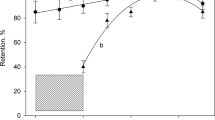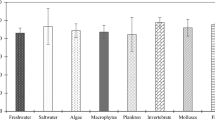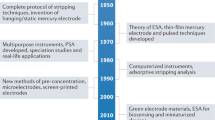Abstract
THE chemical determination of metals chemically bound in biological material at concentrations less than 10−6 gm./100 gm. raises considerable difficulties. This is due to the fact that not all sensitive methods of determining metals in homogeneous material can be adapted to the treatment of samples containing organic compounds in the presence of an excess of other metals.
This is a preview of subscription content, access via your institution
Access options
Subscribe to this journal
Receive 51 print issues and online access
$199.00 per year
only $3.90 per issue
Buy this article
- Purchase on Springer Link
- Instant access to full article PDF
Prices may be subject to local taxes which are calculated during checkout
Similar content being viewed by others
References
Thiers, R. E., Williams, J. F., and Yoe, J. H., Anal. Chem., 27, 11, 1725 (1955).
Wender, M., Wysocki, K., and Magas, S., Urologia, Neurochirurgia i Psychiatria Polska, 6, 593 (1955).
Smoczkiewiczowa, A., and Mizgalski, W., Biuletyn Zagr. Poznanskiego Towarzystwa Przyjaciól Nauk (in the press).
Author information
Authors and Affiliations
Rights and permissions
About this article
Cite this article
SMOCZKIEWICZOWA, A., MIZGALSKI, W. Separation and Determination of Millimicrogram Amounts of Cobalt and Microgram Amounts of Copper in Biological Material. Nature 182, 53–54 (1958). https://doi.org/10.1038/182053b0
Issue Date:
DOI: https://doi.org/10.1038/182053b0
Comments
By submitting a comment you agree to abide by our Terms and Community Guidelines. If you find something abusive or that does not comply with our terms or guidelines please flag it as inappropriate.



